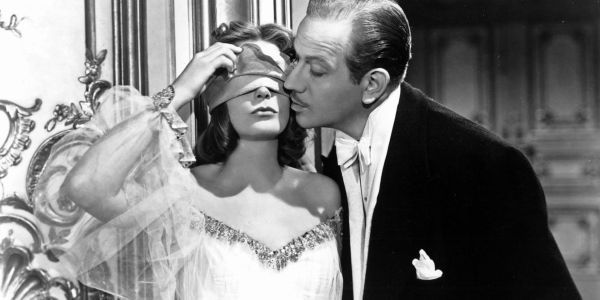“Comrades! People of the world. The revolution is on the march. Bombs will fall. Civilizations will crumble. But not yet, please. Wait. What’s the hurry? Give us our moment.”
– Greta Garbo in Ninotchka
In the autumn of 1939, the crack team at MGM’s publicity department were scratching their heads on how to promote director Ernst Lubitsch‘s latest film, the romantic comedy Ninotchka, starring Greta Garbo. The film had gone through several titles: Give Us This Day, This Time for Keeps and A Kiss from Moscow were all considered and then dropped. MGM chiefs finally settled on the name of the title character, but they were worried that such an unusual name would confuse John Q. Public, so they promoted the film with the clever tagline, “Don’t pronounce it – see it!”
Romance in a time of global chaos
Half a world away, Europe was dealing with more pressing problems. The entire continent was embroiled in World War II, which began on September 1 when Nazi Germany invaded Poland. Ninotchka, a film made by European emigres who fled the Nazi War machine, has both love and war on its mind. On first glance, it’s a frothy comedy where “Garbo laughs,” but under all of the champagne and couture gowns Ninotchka is a plea for peace and tolerance in a world gone mad. Ninotchka was recently released on Blu-Ray with several other great films from 1939, and it’s still as funny and fresh today as it was in that troubled autumn 76 years ago.

Ninotchka begins with three bumbling Soviet appartchiks (Sig Ruman, Felix Bressart and Alexander Granach) who are sent to Paris to confiscate jewelry from the exiled Grand Duchess Swana (Ina Claire). The trio make a fine mess of things, mostly because they are thoroughly seduced by the many charms of the City of Lights. Enter Comrade Ninotchka Yakushova, a rigid and humorless bureaucrat who is sent by Moscow to sort things out.
Of course, MGM chief Louis B. Mayer wasn’t trying to make any profound statements when he handed Lubitsch and the screenwriting team of Billy Wilder, Charles Brackett, and Walter Reisch an original story about a dedicated Bolshevik who finds true love in Paris. Garbo was one of MGM’s greatest stars, but by the late 1930s moviegoers had soured on the elaborate costume dramas that were Garbo’s bread and butter. MGM decided to update Garbo’s image with a modern romantic comedy, directed by Lubitsch, who was Hollywood’s leading arbiter of romance.
The clever script does poke quite a bit of fun at Garbo’s dour image. In the first half of the film, Ninotchka rarely ever smiles and she constantly pleads that she wants to be alone, which is take-off on Garbo’s famous line in Grand Hotel (1932). However, Lubitsch and Wilder, who both fled Germany for Hollywood, were interested in more than tweaking the nose of a world famous actress.
The Lubitsch Touch
Lubitsch came to Hollywood in 1922. He made several silent films, but he didn’t have any real impact as a director until the advent of talkies. Lubitsch made several classics in the early 1930s that cemented his reputation and established the famous “Lubitsch touch”, which is a frothy mixture of romance, wit and ribald humor that appears in many of his pre-code films like Trouble in Paradise (1932), a seminal romantic comedy starring Herbert Marshall and Miriam Hopkins as two thieves who are madly in love. The couple basically have no moral code – they pickpocket one another while in an amorous embrace – but the one thing they do believe in is love. In fact, love is a touchstone in Lubitsch’s work; for many of his characters it’s the only thing that matters.
By 1939, things have changed, even in Lubitschland. Ninotchka eventually falls for the charms of dashing Count Leon d’Algout (Melvyn Douglas). The two lovers visit the Eiffel Tower, nosh at a Paris cafe, and Ninotchka even splurges on a very silly couture hat. However, Leon and Ninotchka’s romantic idyll keeps being interrupted by the larger forces that are controlling their destinies. Lubitsch deals with international politics in ways that are both comic – Ninotchka tries to lead a worker’s revolution in a fancy Parisian restaurant – and tragic. In the scene below, Ninotchka drunkenly ruminates on the real-world realities that are tearing the lovers apart.
Lubitsch would make an anti-Nazi satire in 1942’s To Be or Not to Be, but, in many ways, Ninotchka feels like his most powerful political statement. Lubitsch doesn’t back away from his “love is all” philosophy; instead, he embraced it more than ever in an era filled with extreme political ideologies. The world was too far gone into madness in 1939 for a “lover’s party;” in fact, things would get much worse for both Paris and the world before they would get better. Even so, Lubitsch’s message must have resonated with audiences who wanted “our moment” before the world descended into chaos.
What other movies dealt with the political ideologies of the era aptly? What movies do it today, and how do they do it differently?
(top image source: Metro-Goldwyn-Mayer)
Does content like this matter to you?
Become a Member and support film journalism. Unlock access to all of Film Inquiry`s great articles. Join a community of like-minded readers who are passionate about cinema - get access to our private members Network, give back to independent filmmakers, and more.